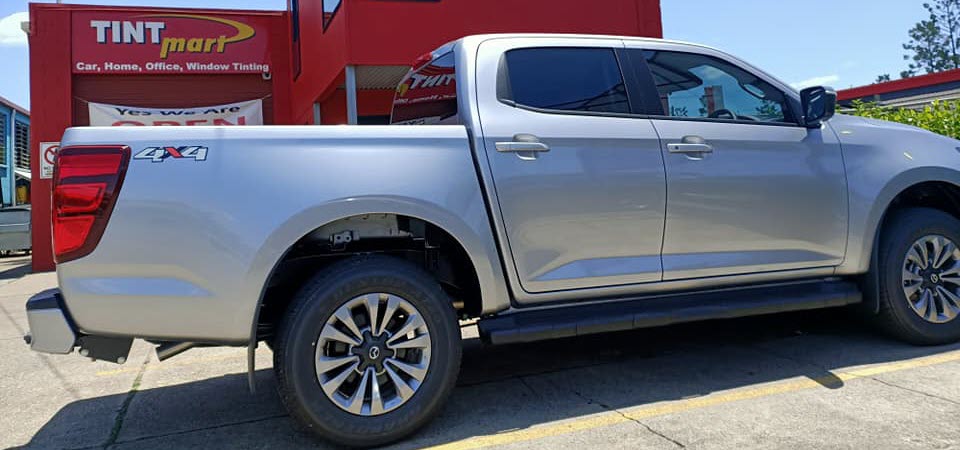Australia's largest independent group of Window Tint Stores Est 1996
What is the Darkest Tint Legal In Australia? [State by State]

In Australia, car tinting laws vary depending on your location. Therefore, it's essential that you check the local restrictions where you live, but also for all the places you're traveling to..
It's better to err on the side of caution if you intend to travel cross country, so you don't fall foul of local restrictions.
Window Tint Percentages in Australia
When you're choosing your window tint, there are quite a few different numbers that you will see. However, there are two that you need to keep an eye on to make sure you are within the law:
The main number is the VLT. This is the visible light transmission. It tells you how much light can pass through the tint. The lower the number, the darker the tint will be. The legal value for VLT will vary depending on where you are in the country and which window you are tinting, so you do need to check this with care.
The second number is the reflectivity. The rules on reflectivity are pretty uniform across the country. They basically limit it to 10%. This means it should be the same as untreated glass. In other words, you can't get a mirror or otherwise distorting tint on your car windows.
Different Windows
Front windows are required to allow more light through than side or rear ones. And it does make sense! Drivers are supposed to see the road clearly at all times, after all.
The general rules for windscreens are the same across most of the country. Only the top 10% of the window is allowed to be tinted and the tinted region must be above the top reach of the windscreen wipers. This is enough to help with glare from the sun.
The tint on your windscreen is limited to between 70-75% VLT. Front side windows are capped at 35% VLT. Rear windows are limited to between 20-15%.
Overview by State and Territory
The following table gives you an overview of the limits for tints by state and territory. Other rules apply when it comes to tint on windows, so it is worth double-checking your local laws before choosing a tint.
Most of these rules concern the state of the tint - it can't be bubbled or peeling. So as long as you choose a good quality installer and provider, you should be fine on this front.
|
Territory/State |
Windscreen |
Front Side |
Rear Side |
Rear |
Reflection Limitations |
|
Top 10% only and above wipers |
35% |
20% |
20% |
Tint reflection limited to 10% |
|
|
Top 10% only and above wipers |
35% |
20% |
20% |
Reflective tint is not allowed |
|
|
Top 10% only and above wipers |
35% |
15% |
15% |
Tint reflection limited to 10% |
|
|
Top 10% only and above wipers |
35% |
20% |
20% |
Tint reflection limited to 10% |
|
|
Top 10% only and above wipers |
35% |
20% |
20% |
Tint reflection limited to 10% |
|
|
Top 10% only and above wipers |
35% |
20% |
20% |
Tint reflection limited to 10% |
|
|
Top 10% only and above wipers |
35% |
20% |
20% |
Tint reflection limited to 10% |
|
|
No applied film allowed |
35% |
20% |
20% |
Tint reflection limited to 10% |
This table may look complicated at first glance, but the good news is that most states and territories have these things in common:
- 35% VLT is the limit for front side windows in all Australian states and territories
- A strip across the top 10% of your windscreen, that can't go below the top reach of your wipers, passes all state and territory laws except for WA which doesn't allow any tinted film to be applied to the windscreen
- 20% VLT is legal for back side and rear windows
- Tint reflection to 10% is permitted in all states and territories except for NSW, where reflective tint is not allowed.
If you have any questions about what tint is right for your car, or you would like to see our range of tints in-person, please come visit our Brisbane Northside window tinting showroom. We regularly tint car windows for customers throughout the Moreton Bay area, from Petrie to North Lakes, Petrie to Murrumba Downs and everywhere in between.
Frequently Asked Questions
Can you tint front windscreens in Australia?
You can only tint the top 10% of windscreens in Australia. This is usually above the top reach of your windscreen wipers.
Is 35 or 20 tint darker?
20% tint is darker as it only allows 20% of the visible light to pass through it.
Do tinted windows affect visibility at night?
Tinted windows reduce the amount of light that can come through your windows. At night there is less light, but it is still reduced. So it will impact visibility. If you can't see clearly then you shouldn't drive. However, most drivers won't notice any negative impact on their night-time vision.
© Copyright 2025 Tint Mart Strathpine, all rights reserved | ABN 95 778 968 763 | Created by clintdesign


